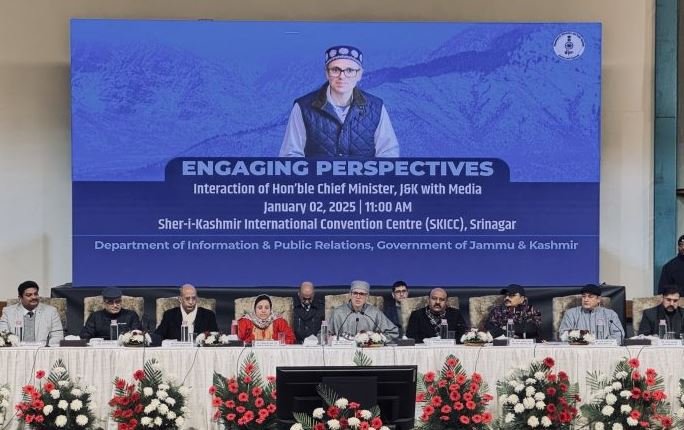Efficient Governance Needs Single Authority, Declares J&K Chief Minister Omar Abdullah
Omar Abdullah Calls for Balance in Development and Agricultural Preservation
Srinagar, Jan 2: Former Jammu and Kashmir Chief Minister Omar Abdullah has criticized the “hybrid model” of governance in the Union Territory, asserting that dual centres of power are counterproductive. Addressing a media interaction on Thursday, Abdullah emphasized that governance is more efficient under a single command structure.
“Dual centres of power are not to anyone’s advantage. If this model were effective, it would have been widely adopted,” Abdullah stated when questioned about the governance setup in Jammu and Kashmir.
Abdullah clarified that while there have been occasional differences of opinion between the administration and the Raj Bhavan, reports of major friction were exaggerated. “Systems function better when there is a unified command. In the case of Jammu and Kashmir, dual centres are built into the governance model. While there have been some differences on certain issues, the scale of speculation is unfounded,” he said, dismissing such claims as imaginary.
The Chief Minister also noted that government business rules are under review and would be finalized after consultations with Lieutenant Governor Manoj Sinha.
Abdullah rejected any notion of discouraging public interaction with the Raj Bhavan. “People should approach any authority where they feel their grievances can be resolved, whether it is the Raj Bhavan, their local MLA, or government officers,” he remarked.
Addressing dissent within his party, particularly National Conference MP Aga Syed Ruhullah Mehdi’s protest over reservation policies, Abdullah highlighted the party’s democratic ethos. “The National Conference has always been accused of being a family-centric party. However, we’ve consistently demonstrated that we are a democratic institution where everyone has the right to voice their opinion,” he said.
Referring to an anti-reservation protest near his residence in Gupkar, which Mehdi attended, Abdullah said, “Protests are a sign of progress. We had a meeting afterward, and I assured the delegates that the cabinet sub-committee is addressing the issue.”
He also challenged Mehdi to extend his activism to the demand for statehood restoration in Parliament, adding, “We need to protect local jobs first before debating reserved and open categories. Without safeguards, people from outside will compete for jobs here.”
On the contentious land acquisition for a National Institute of Technology (NIT) campus in Pulwama, Abdullah stressed the importance of balancing development with preserving productive agricultural land. “Development cannot stop, but we must ensure that projects are located on non-productive land whenever possible. If Pulwama residents oppose the NIT, we are willing to consider alternative locations,” he said.
Abdullah reiterated the administration’s commitment to sustainable development, stating, “We cannot expand our land resources. It’s crucial to strike a balance between progress and protecting our agricultural heritage.”
Abdullah categorically denied such plans when responding to allegations about proposed satellite colonies. “There is no proposal for satellite colonies on my table. Those making these accusations were the ones advocating for a greater Jammu and Srinagar,” he said, taking a swipe at the opposition.
However, Abdullah admitted that urban planning initiatives, such as townships, are under consideration for deconstructing Srinagar. “Downtown areas often house multiple families in a single dwelling. These townships would offer suburban housing options for those looking to move out,” he explained.
As Jammu and Kashmir navigate governance complexities, Abdullah’s remarks underscore the challenges posed by dual command structures and the importance of cohesive leadership. His call for democratic engagement within his party and the broader polity reflects a commitment to dialogue and progress.
The Chief Minister’s emphasis on sustainable development and safeguarding local resources resonates with the pressing need to balance growth and preservation in the Union Territory. Abdullah’s assertion that “systems work better under a single command” offers a crucial perspective on governance in a region grappling with unique administrative and social challenges.
#Governance #JammuAndKashmir #OmarAbdullah #Leadership #Development #AgriculturePreservation #UnifiedCommand #UTPolitics #DualPowerCritique #SustainableGrowth #StatehoodDebate #JobProtection #PublicEngagement #UrbanPlanning #NCLeadership




